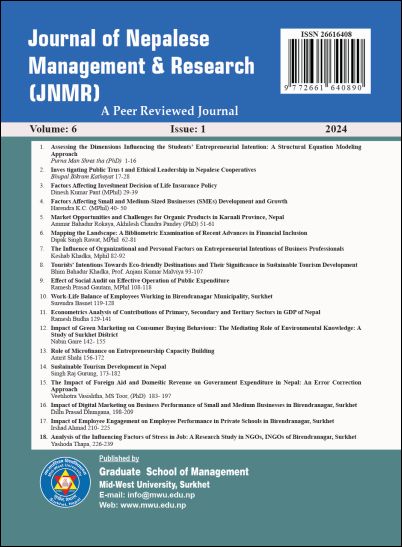Investigating Public Trust and Ethical Leadership in Nepalese Cooperatives
DOI:
https://doi.org/10.3126/jnmr.v6i1.72078Keywords:
Cooperatives, public trust, ethical leadership, transparency, accountabilityAbstract
This study employed a mixed-methods research design, combining quantitative and qualitative methodologies to explore the relationship and impact of leadership on public trust within Nepalese cooperatives. A convenience sample of 736 respondents from various regions was analyzed. Statistical findings indicated that while leadership competence did not significantly influence public trust (Beta = -.104, p = .142), transparency (Beta = .211, p = .002), accountability (Beta = .340, p = .000), integrity (Beta = .495, p = .000), and fairness (Beta = .238, p = .038) demonstrated significant positive effects. Cooperative members emphasized the crucial role of transparency, accountability, integrity, and fairness in shaping trust within cooperatives. Transparency built trust through clear communication, while accountability reinforced perceptions of ethical governance. Integrity's role in upholding ethical standards and fairness in decision-making further bolstered public trust. Effective ethical leadership in Nepali cooperatives requires rigorous training in ethical decision-making, transparency, and accountability, alongside comprehensive codes of ethics and regular audits. Mentorship and inclusive decision-making were crucial strategies supported by transparent reporting, community engagement, stringent ethical standards, and responsive service delivery. These findings were relevant for policymakers and cooperative managers aiming to enhance governance practices and foster enduring public trust. Future research could explore additional contextual factors that influenced leadership efficacy and trust dynamics within cooperative settings, advancing strategies for sustainable organizational governance.




